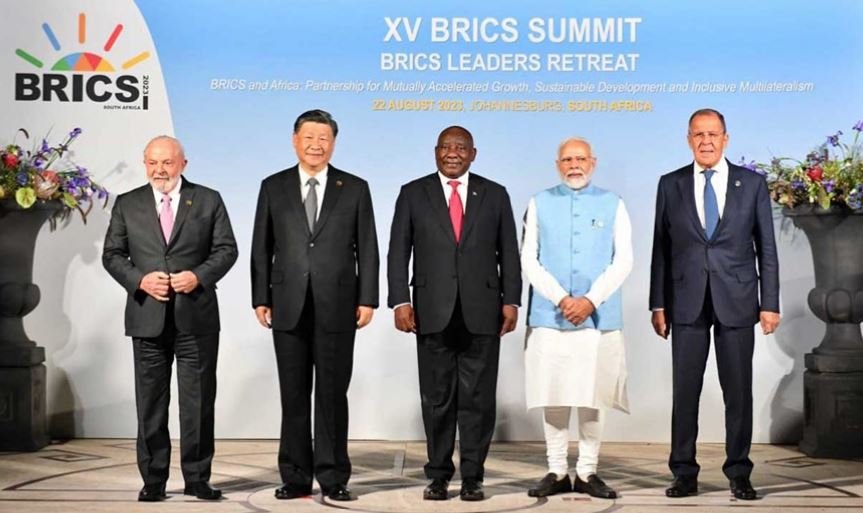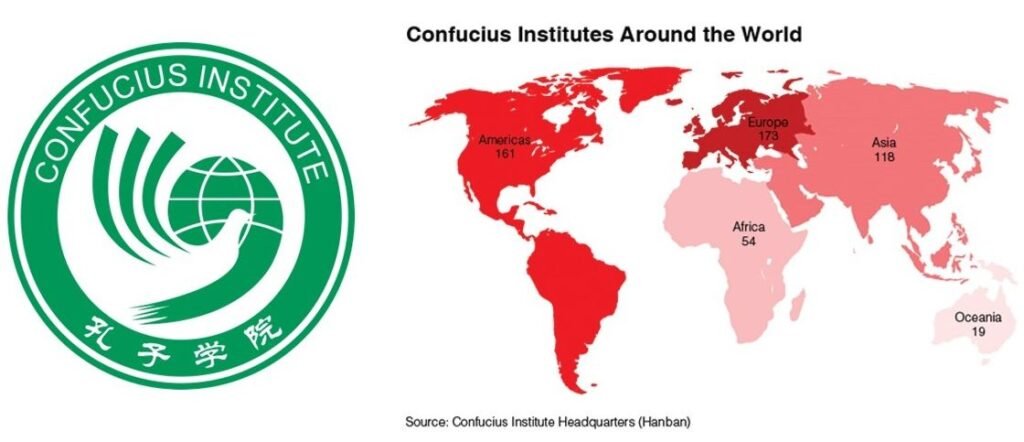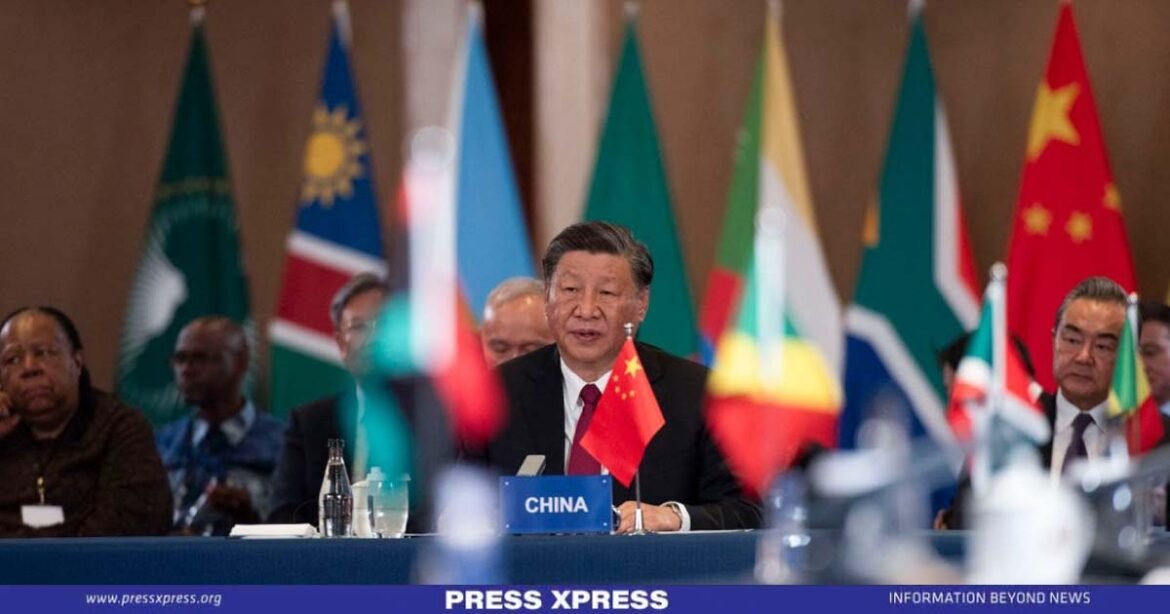While facing domestic hurdles and Western tensions, China is making inroads by doubling the size of BRICS and appealing to the global South with economic and ideological allure
Chinese leader Xi Jinping has endured a challenging summer, grappling with natural disasters, economic uncertainties, and a roster of missing ministers that has left global observers pondering their fates. However, amidst this gloom, a brief ray of hope emerged during the BRICS summit in Johannesburg, where six new nations joined the coalition of emerging economies, effectively doubling its size. With these new additions, BRICS is poised to represent nearly half of the world’s population.
You can also read: West Expresses Concern Over Egypt’s BRICS Membership
Xi Jinping has persistently advocated for the inclusion of new members to bolster the bloc’s global influence, and this expansion aligns with Beijing’s efforts to strengthen and extend its international clout amid escalating tensions with the United States. Within China, domestic challenges persist, including sluggish economic growth and elevated youth unemployment. The ongoing conflict in Ukraine has afforded China an economic lifeline, albeit at the expense of strained relations with Western powers, intensifying its focus on gaining influence in the global south.
Enhancing China’s international image is paramount to this endeavor. Recent research by Pew, conducted in affluent nations, revealed predominantly unfavorable opinions of China. In contrast, middle-income countries exhibited more favorable sentiments, with over 70% of people in Kenya and Nigeria expressing positive views of China.
Thus, while Beijing has not abandoned its hopes of maintaining dialogue and trade with Western partners, its diplomatic efforts are now bifurcated between nurturing those relationships and cultivating an ideological and economic appeal to middle-income countries in the Global South.
Chinese Vice-President Han Zheng articulated this perspective at the UN General Assembly in September, emphasizing China’s natural alignment with the Global South as a large developing nation, sharing common aspirations with fellow developing nations.
The inclusion of diverse countries such as Ethiopia, Iran, and Argentina, alongside Russia and China, within BRICS starting next year, is strategically advantageous for Beijing. It serves to erode the international credibility of the Western-led, rules-based order, as noted by Eric Hollander, editor-in-chief of the China-Global South Project website. Hollander also suggested that this pursuit of a “parallel international governance architecture” may partly stem from Beijing’s bid to compensate for lost access to Western markets.

An impactful economic and ideological enticement
Beijing’s resounding call for the creation of a “multipolar world” resonates strongly with developing nations, as evidenced by the gradual transition from the Belt and Road Initiative (BRI) to the Global Development Initiative (GDI).
The BRI, initiated a decade ago, has poured $1 trillion into nearly 150 countries, as reported by China’s Ministry of Foreign Affairs. China’s willingness to extend loans to nations often struggling to secure financing from institutions like the World Bank has earned Beijing allies in various corners of the globe. However, this approach has also resulted in substantial debt burdens and, in some cases, discontent among local populations. Research published this year unveiled that China expended $240 billion between 2008 and 2021 to rescue countries grappling with their BRI-related debts.
As a response, in 2021, the GDI was introduced during a United Nations address, aimed at promoting international cooperation across various policy domains aligned with the United Nations’ Sustainable Development Goals, including poverty alleviation and addressing climate change. Shortly after the BRICS summit, Beijing announced the establishment of a $10 billion fund to bolster the GDI.
China’s economic challenges could potentially constrain its ability to shower neighboring countries with financial support. One notable distinction between the BRI and GDI lies in the scale of funding provided by each initiative. Yun Sun, director of the China program at the U.S.-based thinktank Stimson Center, pointed out that the GDI “cannot match the financial scale of the BRI.”
Nonetheless, financial resources are not the sole instrument at Beijing’s disposal. Another indication of Beijing’s growing influence in the global south is the proliferation of Confucius Institutes, Chinese state-backed cultural and educational centers offering Mandarin language instruction in over 100 countries worldwide.
In the UK, Europe, and the US, Confucius Institutes have faced scrutiny for allegedly curbing freedom of speech within classrooms. UK Prime Minister Rishi Sunak had pledged to close these institutes last year, but he has since reversed that commitment. In contrast, in the United States, 111 Confucius Institutes have been shut down since 2018, leaving only 10 still operational, as reported by the New York-based nonprofit National Association of Scholars.

A sharp contrast emerges when considering Africa, Latin America, and Southeast Asia, where these institutions enjoy popularity, and issues surrounding their curriculum and teaching methods are not as politically sensitive, according to Olander. In Latin America and the Caribbean alone, there are now 57 Confucius Institutes, as documented by the Andres Bello Foundation, a Colombian institute focused on the region’s relations with China. Over the past two years, the Confucius Institute at the National University of Laos has witnessed a threefold increase in applicants for Chinese language education, with the current count reaching 562.
As prospects for political liberalization within China recede into the past, Beijing’s primary avenue for exerting influence in the West rests on its status as an economic powerhouse and a crucial partner in addressing global challenges such as climate change. In the global South, however, Beijing actively promotes an alternative world order, wielding a robust combination of ideological and economic appeal.
Conclusion
In a world where political dynamics and global influence are constantly evolving, China, under the leadership of Xi Jinping, is strategically expanding its reach. While facing domestic hurdles and Western tensions, China is making inroads by doubling the size of BRICS and appealing to the global South with economic and ideological allure. The contrasting responses to Confucius Institutes in the West and the global South exemplify this multifaceted approach, as China navigates a complex global landscape to secure its place on the world stage.


